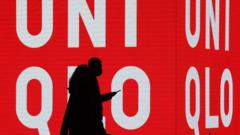In response to comments made by Fast Retailing's CEO Tadashi Yanai regarding Uniqlo's cotton sourcing, the brand is facing a potential boycott from Chinese consumers who are rallying around the controversial Xinjiang cotton issue.
Uniqlo Faces Boycott Threat in China Over Xinjiang Cotton Remarks

Uniqlo Faces Boycott Threat in China Over Xinjiang Cotton Remarks
The company's CEO remarks about sourcing cotton have sparked intense backlash online in China.
Uniqlo, the popular Japanese clothing retailer, finds itself in hot water after its parent company's CEO, Tadashi Yanai, revealed in a recent BBC interview that the retailer does not source cotton from the Xinjiang region of China. His statement stirred a backlash online, with many commentators on the social media platform Weibo calling for a boycott against Uniqlo.
The situation arises from ongoing international scrutiny over Xinjiang cotton, as the region has been accused of utilizing forced labor involving the Muslim Uyghur minority in its production processes. While Beijing has consistently denied these allegations, the controversy has resulted in various global brands facing pressure and backlash in the Chinese market.
Following Yanai's comments, discussion threads erupted on Weibo, under hashtags including "Uyghur cotton is the best in the world" and "Boycott Uniqlo." Users expressed their indignation, suggesting that Uniqlo's leadership was out of touch with consumer sentiment in China. One post stated, "With such arrogance from Uniqlo's founder, will mainland consumers just forget about this? Can we stay firm against this?"
Yanai had initially implied that discussing details about cotton sourcing could "get too political," quickly sidestepping revealing specifics. China's importance to Uniqlo cannot be overstated; the nation serves as a significant market as well as a major production hub.
This episode also sheds light on the challenges faced by many global brands in China regarding the sourcing of Xinjiang products. In recent history, firms like H&M have faced severe backlash for their stance of boycotting Xinjiang cotton. As a result, products from those companies were removed from major Chinese e-commerce platforms.
Further complicating the landscape, China's commerce ministry recently opened an investigation into PVH Corp., the parent company for brands including Calvin Klein and Tommy Hilfiger. This inquiry addresses allegations of an unjust boycott against Xinjiang cotton.
With consumers more informed and engaged, brands must navigate the delicate intersection of ethics, international relations, and local sentiment as the Xinjiang controversy continues to unfold.

















